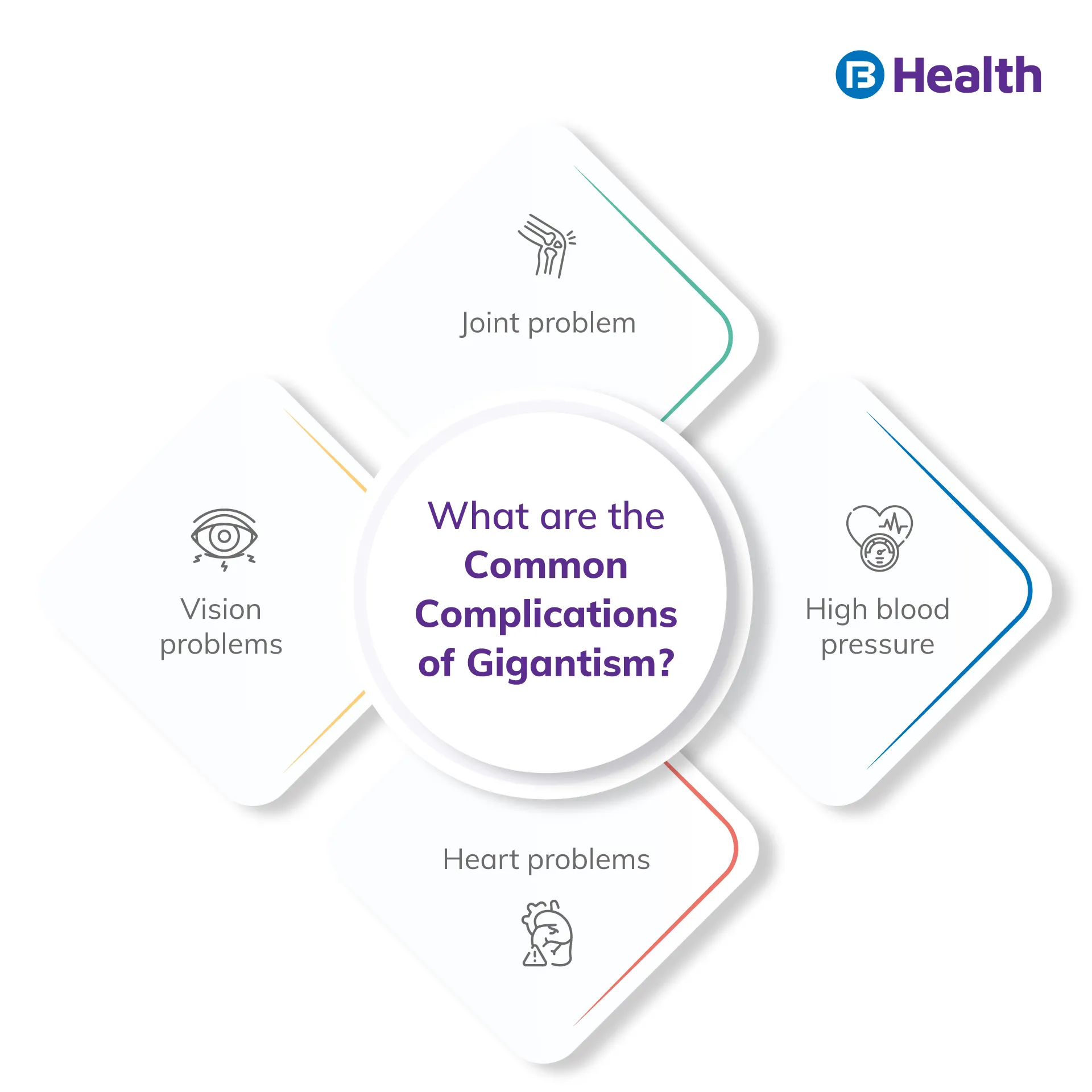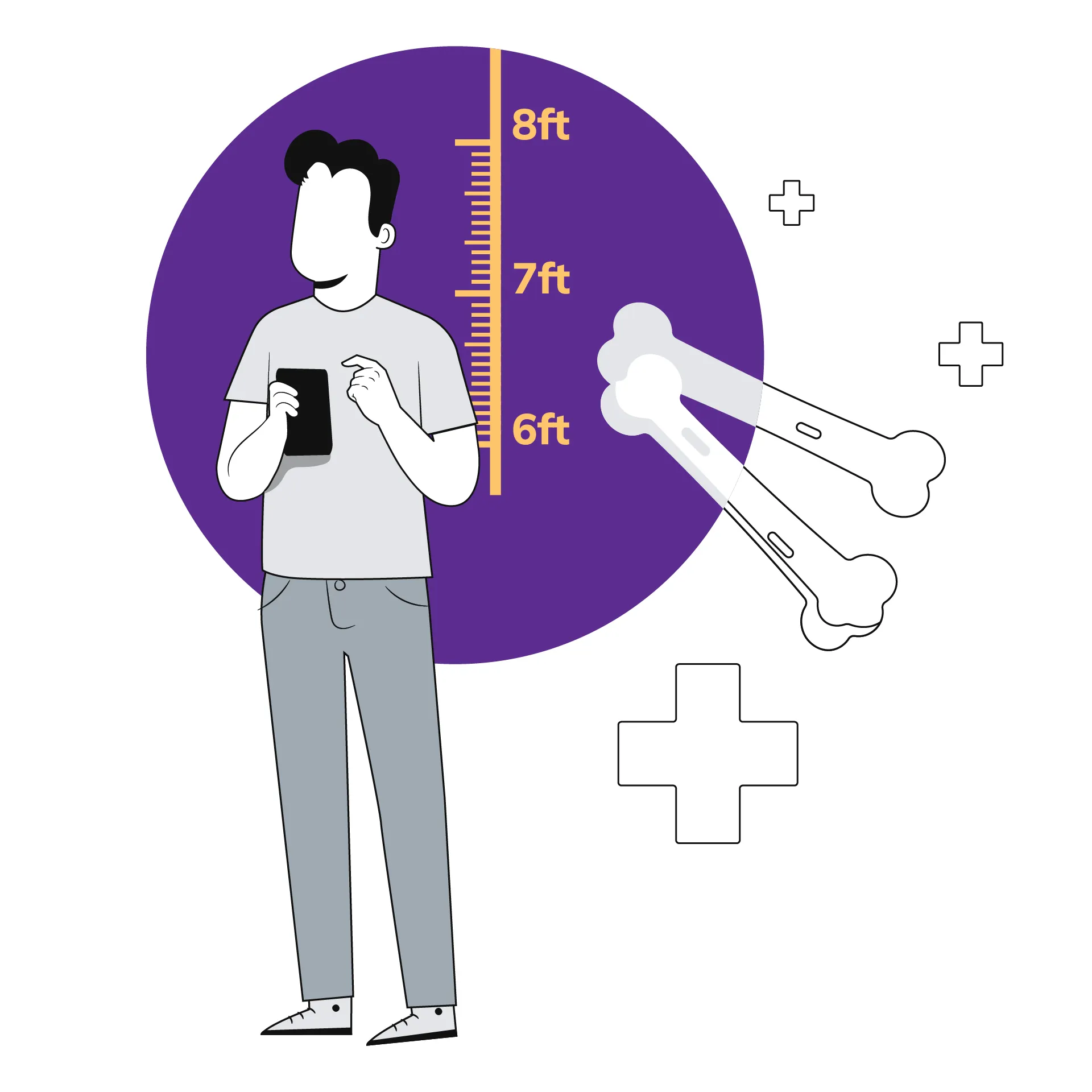Paediatrician | 4 min read
Gigantism: Symptoms, Causes, Diagnosis, Complications
Medically reviewed by
Table of Content
Synopsis
Gigantism is a condition characterised by unusually large body size. People with gigantism may be taller than average, but they may also have other physical features that are disproportionate to their height, such as unusually large hands and feet.
Key Takeaways
- A tumour on the pituitary gland usually causes gigantism
- People with gigantism are more at risk for heart problems, blood pressure, and bone and joint problems
- If gigantism is not treated on time, it can cause serious health problems
Gigantism is a rare condition that affects 3 to 4 people per million every year. [1] A tumour on the pituitary gland usually causes gigantism. This is because the pituitary gland is responsible for the growth hormone, and a tumour can cause it to produce an excess of this hormone. In addition, gigantism is associated with tall height, the opposite of which is seen in turner syndrome.
Living with gigantism can be challenging. People with gigantism may have difficulty finding clothes and shoes that fit. They may also have difficulty with certain activities, such as riding in a car or flying in an aeroplane. Despite these challenges, people with gigantism can lead normal, healthy lives.
Causes of Gigantism
Gigantism causes abnormally large growth because of excessive secretion of the hormone secreted by the pituitary gland due to a tumour. Gigantism can also be caused by genetic conditions, such as Sotos syndrome, also found in progeria or X-linked acromegaly. In some cases, the cause of gigantism is unknown.
Additional Read: Fruits For Heart PatientsSymptoms of Gigantism
The most common symptom of gigantism is abnormal growth. People with gigantism may grow to be much taller than average. They may also have abnormally large bodies and limbs.
People with gigantism may experience the following symptoms:
- Rapid and uncontrolled growth
- Enlarged head and hands
- Thickening of the skin
- Coarsening of the features
- Decreased mobility
- Joint pain
- Vision problems
People with gigantism typically require specialised medical care to manage their condition. If you or someone you know is experiencing any of the above symptoms, please visit your general physician.
Additional Read: Eye Floaters: Causes,Symptoms
Treatment for Gigantism
There are a few gigantism treatment options available depending on the underlying cause. If left untreated, gigantism can lead to severe health problems. A tumour on the pituitary gland usually causes gigantism. This type of gigantism is called pituitary gigantism.
Treatment for pituitary gigantism usually involves surgery to remove the tumour. If the tumour can't be removed, radiation therapy may be used to shrink it. In some cases, medication such as somatostatin may also be used to control hormone levels.
In some cases, gigantism may be caused by a genetic mutation. This type of gigantism is called familial gigantism. There is no specific treatment for familial gigantism. However, some of the symptoms can be managed with medication and lifestyle changes.
If you or your child has gigantism, it's important to see a doctor specialising in this condition. This is because treatment for gigantism can be complex and should be tailored to the individual.
Additional Read: Febrile Seizure in ChildrenDiagnosis of Gigantism
Gigantism can be diagnosed with blood tests, X-rays, and MRIs. It is often diagnosed in childhood when a child's height is significantly above average. Also, a doctor may order a bone age test, which can help to determine if a child's bones are maturing too quickly.

Complications of Gigantism
Complications associated with gigantism include:
Problems in Joint
People with gigantism often have joint problems, such as pain and stiffness. This is because the joints support a lot of extra weight.
High Blood Pressure
Gigantism can cause high blood pressure, leading to other health problems.
Heart Problem
Gigantism can put a strain on the heart, which can lead to problems such as heart failure.
Vision Problems
People with gigantism may have trouble seeing because of the extra pressure on their eyeballs.
People with gigantism are at risk for cardiovascular, joint, and respiratory problems. In addition, gigantism causes social and emotional issues. It can even lead to psychological problems, such as low self-esteem and body image issues. Gigantism caused by Sotos syndrome can also lead to seizures.
Head to Bajaj Finserv Health if you are experiencing any symptoms to get a doctor’s consultation online from the comfort of your home.
References
- https://emedicine.medscape.com/article/925446-overview
Disclaimer
Please note that this article is solely meant for informational purposes and Bajaj Finserv Health Limited (“BFHL”) does not shoulder any responsibility of the views/advice/information expressed/given by the writer/reviewer/originator. This article should not be considered as a substitute for any medical advice, diagnosis or treatment. Always consult with your trusted physician/qualified healthcare professional to evaluate your medical condition. The above article has been reviewed by a qualified doctor and BFHL is not responsible for any damages for any information or services provided by any third party.



